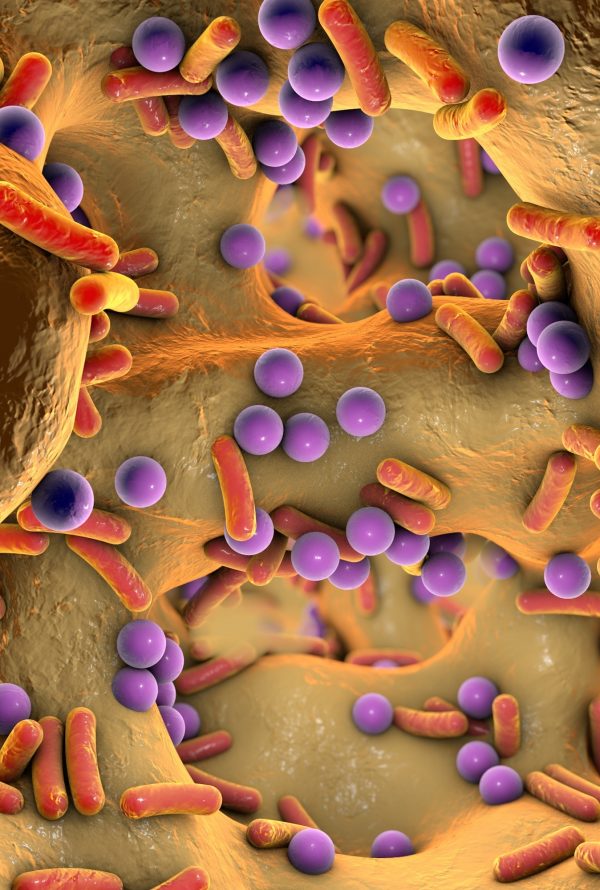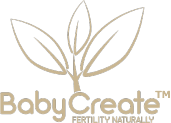
What are Bioactives and how do they help improve Fertility?
23 Mar 2021
How Does Hormone Imbalance Affect Your Fertility?
11 Aug 2022
The Human Microbiome includes trillions of bacteria, fungi, viruses and archaea, essential for our health and fertility.
What is the Human Microbiome?
The community of microorganisms that live in and on our body is called the Human Microbiome. This includes trillions of bacteria, fungi, viruses and archaea that have co-evolved with us (humans) over millions of years.
We are hosts to many different species of microorganisms all living together in communities. They communicate with one another and indirectly with us.
It is estimated we can harbour from 200 to more than 1000 different species within our body. Bacteria are the most abundant of these microorganisms.
We have an Intimate Connection with our Microbiome
Our microbiome connects and communicates with us intimately. They send signals and messages to each other and influence the expression of our genes. They are able to evolve quickly, swap genes, multiply and adapt to changing circumstances within us.
They have access to every part of us, as they circulate throughout our body, ending up in different organ systems and influencing their function depending on the species type and where they live in our body.
We have a ‘symbiotic’ relationship with them and regard them as ‘our friends’ – we need them as much as they need us for survival. And just like any friendship, it works both ways – if we look after them, they will look after us!
Where do our Microbiome organisms live?
Each part of our body provides a different environment for Microbiome organisms. Different species of microbes have adapted to specific habitats, depending on where they live.
The largest and most important microbial habitat is in our gut. The lining of our large intestine (colon) has the highest number of different species of organisms in our body.
Others are found within various tissues, fluids, glands and mucous membranes – including our internal organs, our skin, mouth, nose, eyes, within breast tissue, uterus, ovarian follicles, the vagina, endometrium (lining of the uterus), semen and even in the lining of our blood vessels… they are everywhere!
What are the functions of our Microbiome?
Our microbiome have specific jobs to do depending on their species and where they live.
Some microorganism species living in the lining of the gut (e.g. Bifidobacteria, Lactobacillus, Akkermansia, Faecalibacterium) will ensure the cells lining the gut are healthy enough to provide a good barrier to prevent pathogenic (disease-causing) organisms from entering the digestive tract and causing infection or immune dysregulation.
The same is true for the mucus membrane lining the vagina. Specific microorganisms living there (e.g. Lactobacillus crispatus, gasseri and jensenii) will also act as a barrier, keeping the vagina and the endometrial (uterus) lining healthy to reduce the risk of STI’s and HIV transmission, protect against UTI’s, Endometriiosis, cervical dysplasia and improve birth outcomes.
All in all, our microbiome is vital for the healthy functioning of our Reproductive system; Digestive system; Nervous system; Immune system and Metabolic system.
Variety is the Spice of Life!
Because we humans are such complex beings, we need a large variety of different species of microorganisms in order to carry out a variety of different tasks.
As I mentioned before, our large community of microorganisms (bacteria, fungi, viruses and archaea) living symbiotically with us are all important for our health. I know it sounds strange to think that it’s considered ‘healthy’ to have bugs such as bacteria, let alone fungi and viruses living in and on us, but researchers have discovered (and are continually discovering) reasons for their presence.
Because each species has different functions, the more variety of different friendly microorganism we have, the more diverse our microbiome and the healthier we are.
In this regard ‘variety is the spice of life!’
Our Microbiome – Friend or Foe?
Our microbiome is made up of both friend (commensal) and foe (opportunistic) bugs. We actually need both in their right numbers to keep things balanced and stable.
If our commensals are low in number and variety, our opportunistic bugs will take advantage of the situation, grow in numbers and cause an imbalance in the environmental ecology. This is called ‘dysbiosis’.
What does our Microbiome feed on?
We need to keep our friendly organisms strong, healthy and in good numbers. Like all living creatures, our microbiome needs to be nourished to live and function properly.
When we eat, all the nutrients get absorbed into our blood stream via the small intestine. The left-overs – whatever we aren’t able to digest which is mostly fibre, end up in the large intestine where most of our microorganisms reside.
The job of our friendly ‘commensal’ organisms is to munch on this (human indigestible) fibre and produce ‘Short Chain Fatty Acids’. These are very important substances that prevent inflammation and are used to keep the gut lining and our mucus membranes healthy and disease-free. In fact, they are also used to make essential vitamins especially all the Vitamin B’s as well as the very important fertility vitamin – Folic acid!
Alcohol, smoking, recreational drugs, certain medications, antibiotics, antimicrobials, processed foods (including sugar – real and artificial), flavours and colours will starve or kill our commensals. So we end up feeding and increasing the numbers of opportunistic ones instead.
These opportunistics devour all that processed stuff and produce ‘Lipopolysaccharides’. These substances get into our blood stream, travel all over our body causing havoc! They bring about inflammation and interfere with our immunity, fertility, mental health, digestion and our hormones.
Where does our Microbiome originate?
It all starts with our mothers!
Right from the beginning of life, the foetus is exposed to small amounts of the mother’s unique microbiome through the amniotic fluid, the umbilical cord blood, as well as the placenta.
From birth, the microbiome will influence the development of the baby’s immune system.
If this process is disrupted, there is an increased risk of developing many inflammatory and allergic conditions including allergies, food intolerances, asthma, eczema and autoimmune diseases.
What’s the best way to look after our Microbiome?
We need to keep our friendly organisms strong, healthy and in good numbers. Like all living creatures, our microbiome needs to be nourished to live and function properly.
To keep your microbiome healthy and nourished:
- Eat real, unprocessed foods – organic, seasonal variety is best.
- Eat a variety of foods that provide a diverse range of essential microorganisms (Probiotics) e.g. fermented foods such as yoghurt, kefir, kimchi, sauerkraut, kombucha and tempeh.
- Consume plenty of diverse fibre from fruits, veggies, beans, legumes, nuts, seeds, berries and whole grains (Prebiotics). These provide nourishment for the good micro-organisms to grow and reproduce.
- Look after your oral health – brush and floss your teeth every day.
- Aim to get a good quality 7-8 hours sleep every night.
- Connect with nature and soil microbes – gardening, hiking, having a pet animal.
- Keep physically active – do exercise daily.
- Socialise and become community involved.
- Reduce your stress levels and cultivating positive stress management techniques – yoga, meditation etc.
What do the healthy microbiome organisms do for fertility?
Plenty!
They have a vital role to play in keeping both men and women healthy and fertile.
- They help with fertility by improving egg quality as well as sperm motility and morphology. They provide them with nourishment, energy and prevent oxidative stress.
- They keep the vaginal, uterine and testicular linings healthy by optimising their immunity, preventing the development of antisperm immunity and keeping a balanced pH (acidity level) which is important for a healthy embryo environment.
- They provide immune signals and communication between the gut, the brain and all the reproductive cells, tissues and organs.
- They are the first line of defence against disease-causing pathogens such as STDs which are known to be risk factors for sub-fertility.
- They help to balance reproductive hormones, so assist in conditions which can interfere with fertility – such as PCOS, Thyroid and Autoimmune diseases.
- They keep inflammation in check, so help in the prevention of Endometriosis, fibroids, cysts, varicoceles and other inflammatory conditions. https://www.cell.com/med/fulltext/S2666-6340(24)00373-8?utm_source=brevo&utm_campaign=premium_digest_oct_18&utm_medium=email
- They provide a supportive role in successful pregnancy by creating the right environment for uterine receptivity, improving embryo implantation and preventing miscarriage.
- They are known to play a supportive role in increasing implantation and live birth rates as well as decreasing the rate of infection during IVF and other Assisted Reproductive Technology procedures.
- They offer a hospitable environment for the newly conceived embryo and growing foetus.
- During childbirth the mother’s precious microbiome get transferred to the newborn baby. This gives the baby’s immune system a head-start in life.
- Pre-pregnancy and pregnancy-related gut microbiome diversity contribute to post natal mental health status.
- Latest research has shown that after birth, newborn babies’ fathers play such an important role in the health of their baby via their own ‘paternal’ microbiota.
Which Vaginal Microbiome Organisms are helpful for Conceiving, Preventing Miscarriage and Improving chances of Successful IVF?
According to research, the microorganism (good bug) that plays a pivotal role in determining fertility is Lactobacillus crispatus (L. crispatus).
A healthy genital microbial environment is one in which L. crispatus dominates the vaginal and uterine microbial environment i.e. it outnumbers the pathogenic organisms (bad bugs).
Dysbiosis is when these pathogenic organisms (bad bugs) dominate the environment – these include Chlamydia trachomatis; Gardnerella vaginalis (one of the species causing Bacterial Vaginosis); Ureaplasma; Escherichia coli; Prevotella; Dialister; Candida albicans.
When this occurs, they will interfere with fertility by preventing or slowing the time it takes to conceive. They can also cause recurrent implantation failure complicated by Endometriosis. And have also been implicated in recurrent miscarriage or premature rupture of membranes (PROM).
Whereas a L. crispatus dominant vaginal/uterine microenvironment will increase the rate of conception as well as successful IVF, and also promote a healthy pregnancy by preventing miscarriage.
When L. crispatus is outnumbered by other organisms
As you can see, it’s very important to look after your microbiome so that it can function properly and keep you healthy and fertile.
Fertility Naturopath and Microbiome Analyst
As a Fertility Naturopath and Microbiome Analyst, I place a huge importance on the microbiome health of all my patients.
In certain situations when I think it’s appropriate, I will suggest a Vaginal Microbiome Test for those women who have been diagnosed with fertility related issues such as unexplained infertility, recurrent miscarriage, chronic inflammation and infections (PID), PMS, PCOS, endometriosis, male and female hormonal imbalance as well as egg and sperm health issues.
From those results, I will design a personalised individual treatment strategy that has been researched in well-designed clinical trials to help improve their microbiome environment, by getting rid of the ‘bad bugs’ and increasing the number of ‘good bugs’.
I also always discuss diet, oral health, exercise, stress reduction and sleep, as these are very important features known to impact fertility and the health of the baby.
Sometimes I might prescribe specific prebiotic fibres to help increase the abundance of certain friendly organisms – if I’m lead to believe, through microbiome analysis, that they are in low numbers.
I hope my explanation has helped you understand the vital role that a healthy microbiome plays in fertility, conception, pregnancy and a healthy baby!
Joanne Lipinski – Fertility Naturopath Melbourne
